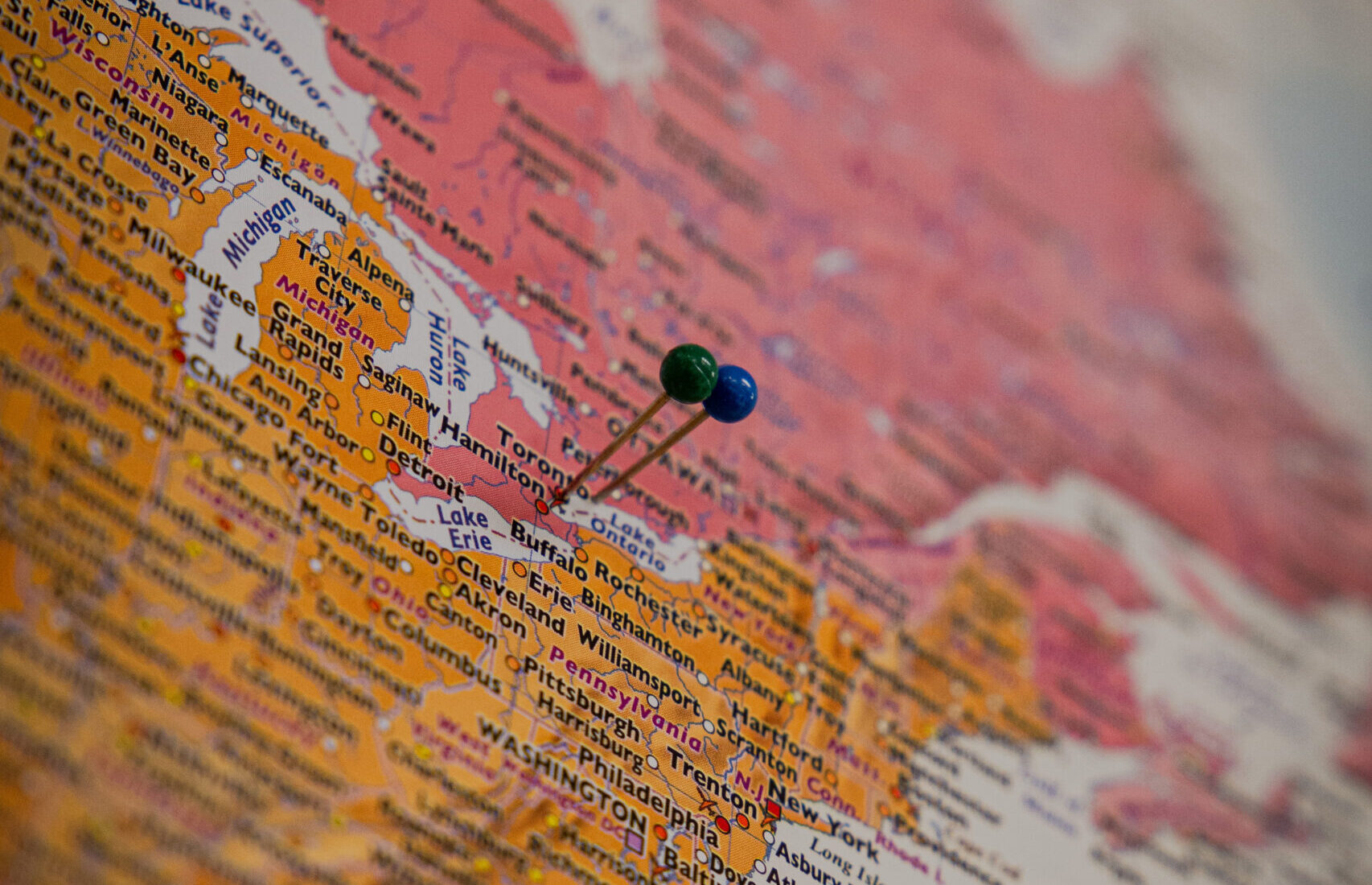From speaking with Navitas to partnering up with Lovely Professional University, the University of Guelph is exploring their options for international recruitment

Editor’s note: This story was previously published in The Ontarion’s March 2024 issue.
On Jan. 17, a town hall meeting was held at the University of Guelph to provide insight and get feedback on their potential partnership with Navitas, a private international student recruitment company.
Pathway programs have become increasingly popular among Canadian universities as they look to internationalize their campuses. With universities like McMaster and Toronto Metropolitan University, (formerly Ryerson) signing on, even the University of Guelph is looking to expand their international recruitment through these programs.
On Feb. 5, following vocal opposition from faculty and some students, a senate meeting was held where it was revealed that the university had paused its talks with Navitas.
At the same meeting, the senate approved a partnership with Lovely Professional University, a private university in India for a pathway program into the University of Guelph’s agricultural college.
Government Cuts
On Jan. 17, 2019, the Ontario government measures to reduce university tuition by ten per cent and freeze tuition at its current level for domestic students.
This helped students save an average of $660 on tuition during the 2019-2020 school year, according to a press release from the provincial government.
This pre-pandemic tuition freeze has continued on for five years.
“By freezing tuition for another year, we are saying yes to ensuring that students have access to affordable, high-quality post-secondary education,” said Jill Dunlop, Minister of Colleges and Universities in a release from March 2022.
In November 2023, a blue-ribbon panel of experts called on the Ontario government to lift the tuition freeze.
“As time goes on, this situation is ever more likely to pose a significant threat to the financial sustainability of a major part of the province’s postsecondary sector. Higher rates of price inflation in the last two or three years exacerbate this threat,” the panel said.
The report explains that in 2021-2022 Ontario’s university funding worked out to $11,471 per student, compared to the Canadian average of $20,772 per student.
The government-commissioned panel recommended that tuition be raised by five per cent in the 2024-2025 academic year, and a two percent increase in tuition in the year following, along with additional tuition raises in line with the federal inflation rate.
In addition to tuition freezing and reducing costs, the government also scrapped a number of grants to students and universities. Losses from university amount to just over $1.1 billion.
“No province has underfunded postsecondary education more, and no province’s institutions have found so many ways to raise money from private sources,” says a report titled The State of Post-Secondary Education in Canada in 2023.
Record inflation is another one of the reasons why universities and students have been struggling in light of these tuition freezes.
In 2023 the annual inflation rate was 3.9 per cent. The year prior had an inflation rate of 6.8 per cent, the highest in 40 years. This affects the day-to-day costs for families, students and the university.
On Dec. 5, Charlotte Yates released an open letter to the university community about the lack of government funding and how it affects the University of Guelph.
“To weather this storm, we have undertaken several short-term measures,” the letter reads. “These include a 5.5 per cent reduction to our base operating budget, reducing services and leveraging our reserves — none of which are long-term sustainable practices.”
In addition to the tuition freeze, and rising inflation, declining enrolment has also been a factor with multiple universities across the province.
Many of these institutions have increased their enrolment of international students to make up for the loss in domestic tuition fees. International students pay up to three times more in tuition compared to their domestic counterparts, according to Stats Canada.
Universities like Wilfrid Laurier, Toronto Metropolitan University and the University of Manitoba have partnered with an international student recruitment firm, Navitas, to help ease the financial strain.
Navitas
Navitas’ business model is to recruit international students who typically wouldn’t qualify for Canadian universities. These students would study through a Navitas-run program using campus space. They would have the opportunity to complete their degree at the partnered university, should their grades be sufficient.
According to Navitas’ website, it’s partnered with over 300 universities worldwide. They also list 28 universities as part of their international pathways program. Navitas uses the campuses of these universities to teach their students and in turn gives the universities royalties for using their space and branding.
In a meeting of the Board of Governors at the University of Manitoba, who has partnered with Navitas, conservative estimates said the university is poised to receive $100 million in funding from their partnership with Navitas over the first decade of their partnership.
In a letter to the board of governors from the University of Guelph Faculty Association, (UGFA), Faculty expressed their concerns about the possible partnership. Their letter cited concern for the quality of education the students would receive, the outsourcing of teaching, the university’s reputation and the wellbeing of the students in these programs.
“The University’s commitment to internationalization and EDI [Equity, Diversity and Inclusion] will be undermined and tainted by this initiative, as its principal requirement is the ability to pay high fees,” they said in their open letter.
They also expressed worry about students and their families possibly being exploited as well as creating segregated international groups and how the agreement would affect the overall strain on campus facilities and resources.
Navitas is a private company owned by equity firm, BGH Capital, whose primary purpose is to generate profit for its shareholders.
Faculty also got the chance to voice their concerns about Navitas at a town hall meeting held in Peter Clark Hall on Jan. 17.
Associate vice president academic, Byron Sheldrick, spoke with faculty members about how the program would possibly work.
“Our overall goal, though, is over the next several years to increase our intake from what now is about 270 a year to maybe 400 to 500 over the next five years,” he said during the presentation.
Faculty members and students raised concerns about the partnership with Navitas and questioned the financial aspect of the program.
“These are real people trying to have real educational experiences that will lead to success. I don’t see this leading to success,” professor Andrew Hamilton-Wright said during the meeting.
History professor Karen Racine also voiced her opinion.
“International Student Recruitment isn’t going to be the solution to our problems,” Racine said.
Nate Broughton, University of Guelph student and one of two Central Student Association, (CSA), board representatives for College of Engineering and Physical Sciences, brought the issue to the CSA’s attention. He said he was optimistic about the acknowledgement of opposition.
“I would like to think that, at least at some level, they took notice of the amount of opposition that they were facing, and heard the students and faculty and everyone else on campus that was saying this is not a good idea,” said Broughton, speaking in his role as a student.
Sheldrick also mentioned there are different approaches to working to internationalize campus. One of the programs he mentioned during the town hall was an admission pathway between a private university called Lovely Professional University, (LPU), located in Phagwara, India, and the Ontario Agricultural College, (OAC).
LPU
In a news release posted on Feb. 12, the university announced its partnership between LPU and the OAC to the public.
The university did not confirm when talks of a partnership with LPU began.
However, on Feb. 19 2023, an LPU Instagram account posted photos of U of G president Charlotte Yates visiting the campus in India. The post said that Yates attended LPU to “discuss opportunities for students and faculty.”
LPU is owned by the Lovely Group in India, which is run by Ashok Mittal, a businessman and former politician. Lovely Group operates businesses spanning different industries that are grouped into Indian sweets, auto dealerships, education, packaged food, hospitality and others, in addition to Lovely Professional University.
“It is shocking that, while facing strong opposition to their Navitas initiative, the administration did not think to mention to the UGFA or the University community that there were separate discussions with LPU,” said Kunze in an email to the UGFA membership.
Kunze also mentioned in his email “unlike Navitas, LPU is at least a degree-granting university that is considered by university ranking systems.”
Jessamine Luck, manager of stakeholder communications for the University of Guelph, said in an email the “pathway will start in fall 2025 with an initial cohort of five to 10 students and this number will slowly grow over time according to program capacity.”
Luck said that the program follows a similar process as the degree pathway for students with an associate diploma in agriculture at U of G’s Ridgetown campus who wish to apply their credits toward a bachelor of science (agriculture) degree.
She did not comment on exact similarities or differences between the programs.
Broughton said the differences between LPU and Navitas did change his perspective.
“I think that on one hand, it is a little bit different,” he said. “It is … an accredited institution, which is ranks in… university rankings. It’s more reputable than Navitas in that sense.”
Luck explained further.
“Its agriculture program is accredited by the Indian Council of Agricultural Research,” Luck said. “As part of the pathway development process, U of G faculty have rigorously assessed LPU’s agriculture program curriculum to ensure consistent academic standards between the two universities.”
Both Navitas and LPU are technically 2 + 2 pathway programs, but work differently.
LPU is a private university, whereas Navitas is a company that is hired to recruit students.
Navitas does not have its own campus, but it uses existing space at their partnering universities. However, LPU is an accredited university with a campus that students will attend for the first two years of their program.
Navitas agrees to pay the university for their space, whereas with Lovely Professional University it is a “memorandum of understanding” agreement.
However, they both work to outsource international student recruitment to financially benefit the universities they partner with.
Student cap & new funding
On Jan. 22, the federal government announced a cap on how many international students post-secondary institutions were allowed to take in.
“In light of the recently announced cap on international students, further discussion on a potential partnership with Navitas has been paused until we have a more accurate picture of what international student recruitment will look like in Ontario,” Luck said.
Broughton said that he hopes the pause on talks with Navitas are permanent.
“I’m happy that they’ve paused discussions for the time being. Hopefully that is a kind of permanent pause,” he said. “I guess it will depend on what the interpretation of these regulations looks like.”
On Feb. 26, in response to the blue-ribbon panel’s recommendation the provincial government announced almost $1.3 billion in funding for post-secondary institutions that are struggling due to underfunding.
The funding will be distributed over the next three years. According to the Ontario government’s press release, “the government is continuing to evaluate the blue-ribbon panel’s advice and is working with postsecondary sector partners to create the right conditions to help students access and succeed in postsecondary education.”

